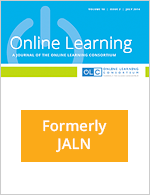Introduction to the Special Issue: Faculty Development for Online Teaching
As co-editors of this special issue on faculty development for online teaching, we would like to make a few points before readers engage in the articles included in the issue. First, we intended the special issue to include research on faculty development programs, especially research that was based on an appropriate theory. These studies seem especially important given their exploration of the usefulness of theory for creating faculty development activities and evaluating theireffectiveness

